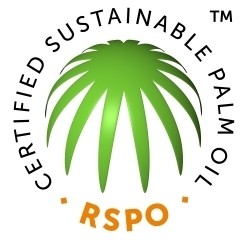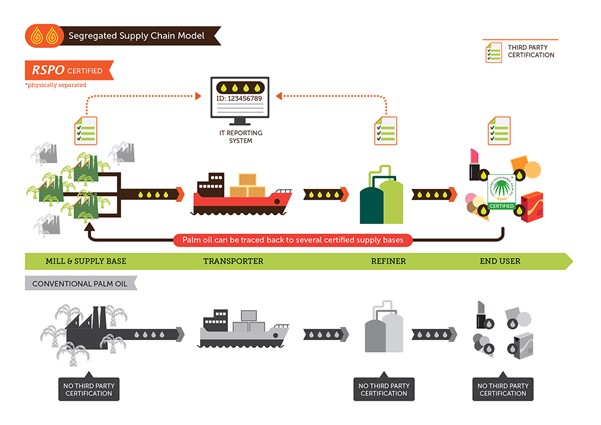
Cloetta’s sustainable palm oil program is built on two approaches: to purchase palm oil that benefits the planet and people, and to replace palm oil in our products where it does not interfere with the quality.
100% RSPO-certified segregated sustainable palm oil
Since 2019, for all palm-oil based vegetable oils we purchase (part of the content in an oil or fat) is 100% RSPO-certified segregated palm oil, in accordance with the Roundtable on Sustainable Palm Oil (RSPO). Check our progress at www.rspo.org.
RSPO-certified segregated palm oil is the highest possible standard that provides traceability while ensuring that the sustainable palm oil is being kept separate from conventional palm oil throughout the supply chain (see figure below). However, Cloetta does not buy pure palm oil but only oils and fats that contain derivatives of palm oil to a varying extent. Cloetta aims to preserve the rainforests for future generations. This certification also ensures that 100% of the palm oil content in our products is deforestation-free. This means it is NOT grown in:
- Primary forest
- Peatlands
- Areas with protected forests
- Areas where slash-and-burn farming is used in plantation operation
In 2019 Cloetta’s factories using palm oil were certified according to RSPO’s segregated supply chain standard. In 2020, the on-pack communication of RSPO palm oil was removed due to two reasons. Firstly, the text previously used did not reflect the higher level of certification. Secondly, the RSPO trademark requirements for an updated text would take up too much space to allow for other important product information. Cloetta’s continued commitment to use 100% RSPO segregated palm oil remains unchanged.
Today, RSPO is the most widely supported method for achieving sustainable palm oil production. Cloetta has been a member of the RSPO since 2004.
Replacing palm oil
In 2016 a decision was made to replace the amount of palm oil that is found in Cloetta’s glaze. Confectioner’s glaze is used in most of Cloetta’s products to create a shiny and protective surface that prevents the products from sticking together, for example in a bag. Replacing palm oil with alternatives may not be the best course of action in terms of sustainability or product quality. In order to understand the complexity behind palm oil, please read below.
About palm oil
From a sustainability perspective, there are several problems surrounding cultivation and production of palm oil and palm kernel oil.
Palm oil is extracted from the fruit of oil palm (Elaeis guineensis) which is a crop with very high yields. It is one of the most traded vegetable oils in the world. Malaysia and Indonesia account for nearly 90 per cent of total global palm oil production, and if cultivated in a sustainable manner it can be an important source of income and economic development in these countries. However, there are several environmental and social challenges associated with the production of palm oil, such as deforestation in environmentally sensitive areas, that have a negative impact on entire ecosystems.
According to a recent research report entitled ‘The environmental impacts of palm oil and its alternatives’, there is an important difference between the absolute and relative environmental impact per-tonne-oil yield.
- In absolute figures, palm oil has the highest
- Per-tonne-oil, palm oil has the lowest impact
RSPO-certified palm oil has now reached 19% of total global production, so there is still a far way to go until sustainable palm oil is the norm.
To read more about palm oil and the principles that RSPO-certified producers abide by, please visit: RSPO certified palm oil.
